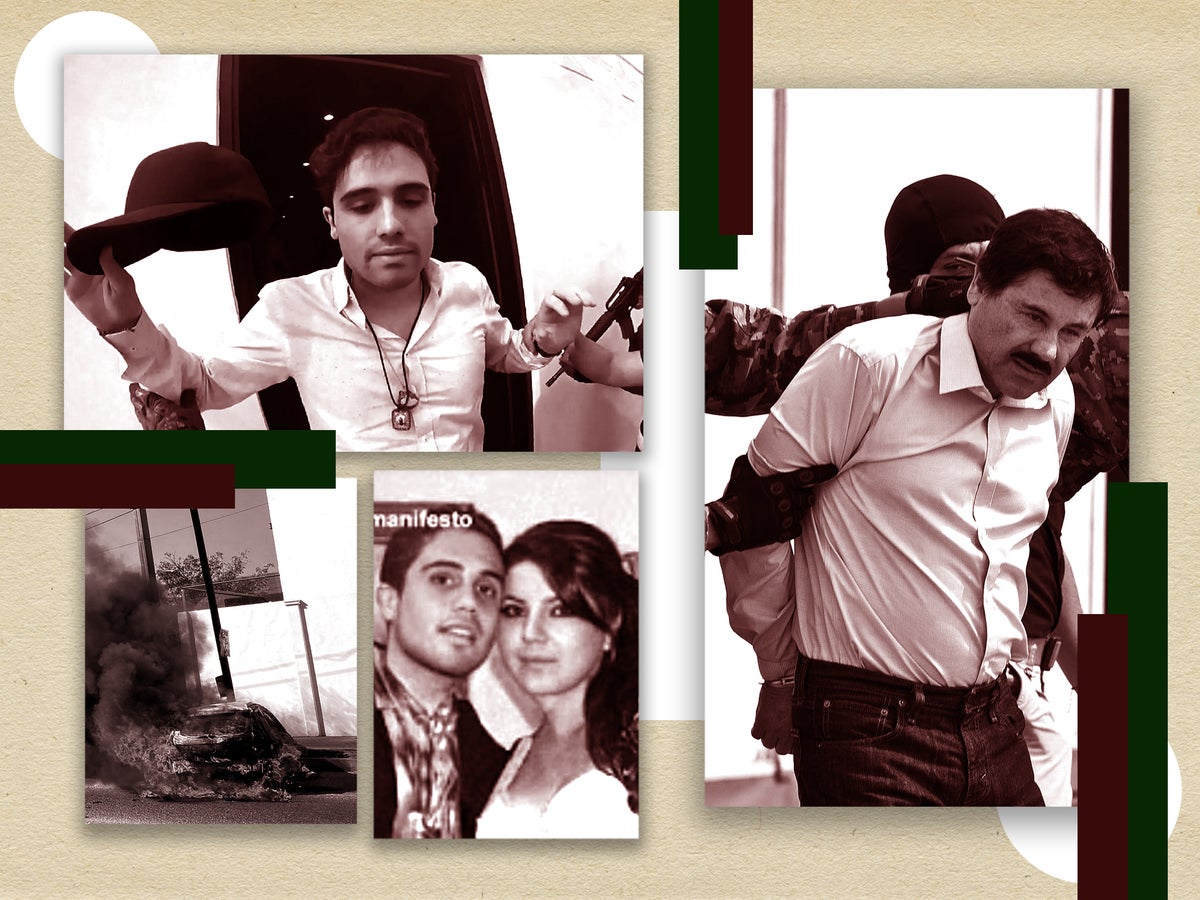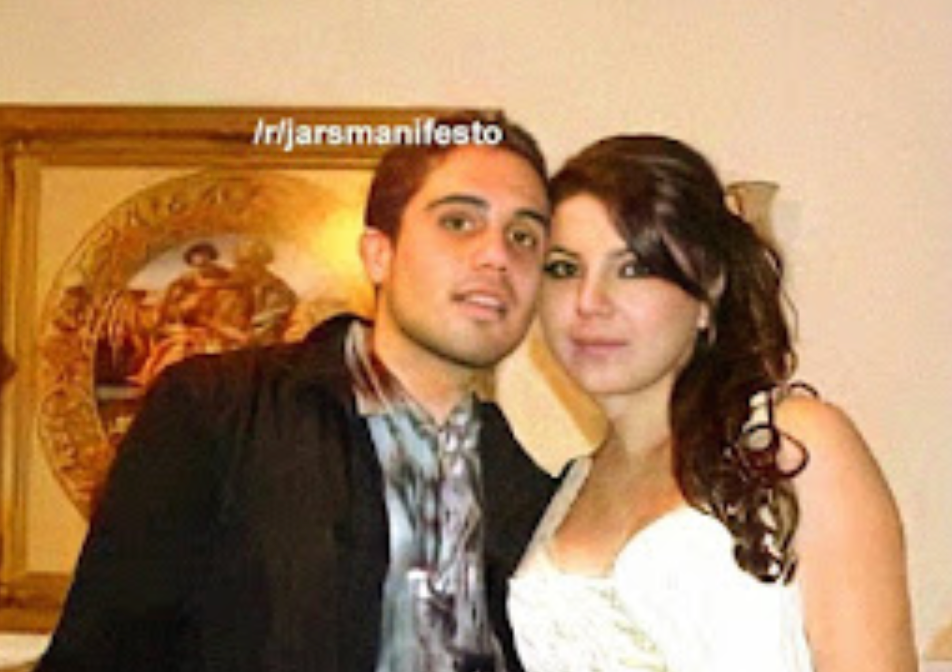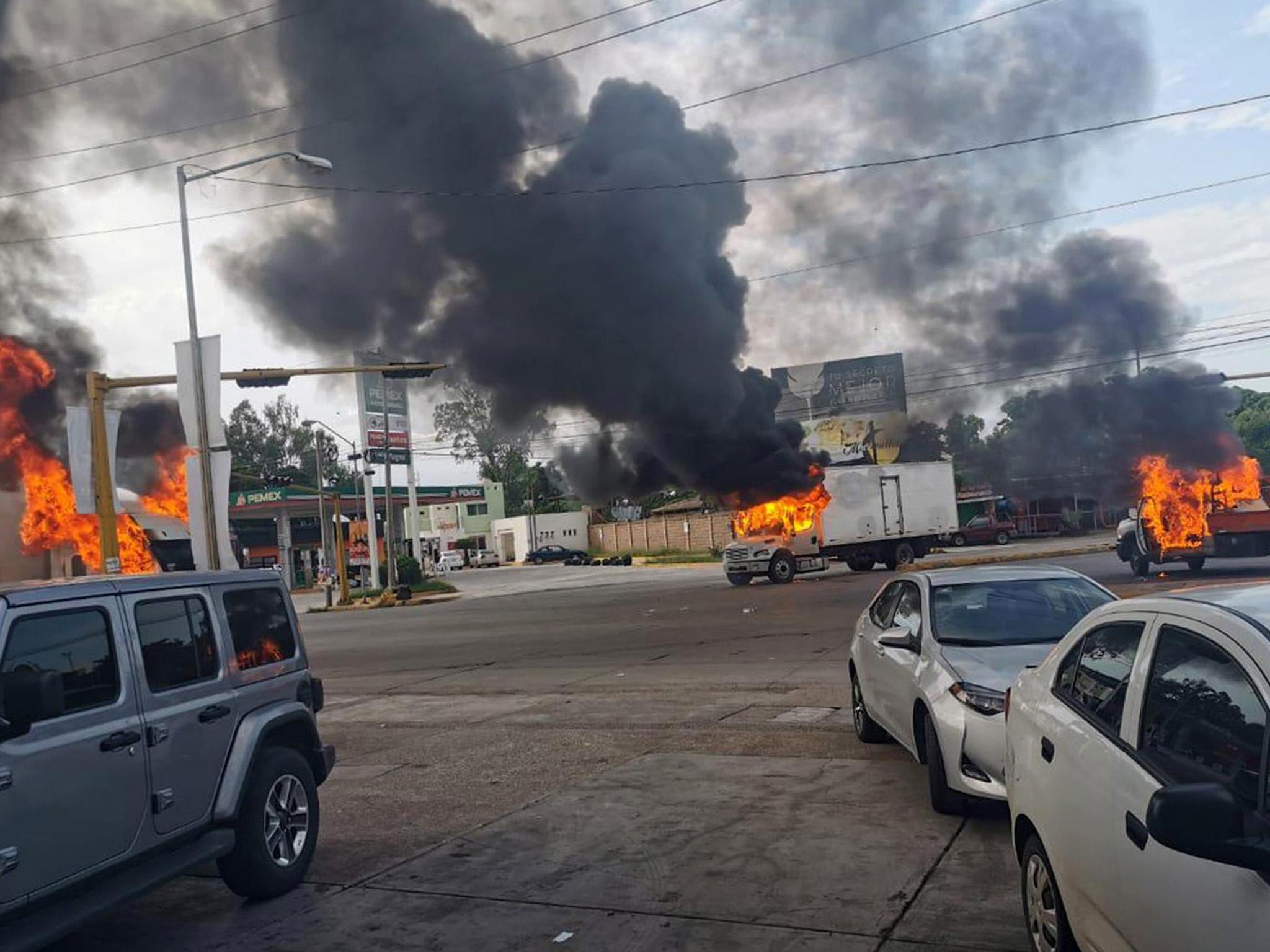
Security forces in Mexico arrested the son of jailed drug lord Joaquin “El Chapo” Guzman during a pre-dawn raid on a remote Sinaloan village on Thursday, Mexican authorities say.
Ovidio “El Raton” Guzman, 32, was taken into custody after a gunfight between federal authorities and Sinaloa Cartel in Jesus Maria, the Mexican defence secretary Luis Cresencio Sandoval confirmed at a press conference on Thursday.
According to US authorities, Guzman is a major manufacturer and trafficker of fentanyl and methamphetamine imported across the border.
His arrest set off a night of terror in the Sinaloan state capital Culiacan as cartel members hijacked trucks and set them alight, blocking major exits to the city.
Guzman’s arrest was hailed as a major blow by Mexican authorities against the cartels by Mr Sandoval.
The narco-traffickers’ bloody war with the government has claimed tens of thousands of lives each year since 2006.
Who is Ovidio ‘El Raton’ Guzman?
Ovidio Guzman-Lopez is one of four children born to Joaquin Guzman and his second wife Griselda Guadalupe Lopez and was born in 1990 in the town of Badiraguato.
When his older brother Edgar Guzmán-López was shot dead in 2008, Ovidio and his brother Joaquín Guzmán-López inherited a stake in their father’s global narco-trafficking empire, according to the US State Department.

El Chapo was during that period the most wanted drug kingpin in the world, running his cartel from the mountainous western Mexico state of Sinaloa while always remaining one step ahead of authorities.
The two Guzman brothers began purchasing large amounts of marijuana in Mexico and cocaine in Colombia, the US State Department claims.
They expanded their operation to purchasing large amounts of ephedrine, a precursor to meth, from Argentina and smuggling it into Mexico.
In 2012, the US Treasury Department designated him and another brother, Iván, as key lieutenants in the Sinaloa cartel.
After his father’s arrest and extradition to the United States in 2017, Guzman assumed the leadership off the Sinaloa Cartel along with three of his brothers, according to the US State Department.

The Guzmán-López brothers oversee 11 drug labs in the state of Sinaloa that produce an 3,000 to 5,000 pounds of pure methamphetamine each month.
The methamphetamine is sold wholesale to distributors in the United States and Canada.
Immigration and Customs Enforcement issued a $5m reward for information leading to his arrest after he was indicted on drug trafficking charges by a US grand jury in 2018.
The State Department says that Ovidio Guzman has also ordered the murders of informants, a drug trafficker, and a “popular Mexican singer who had refused to sing at his wedding”.

It’s unknown how many siblings he has, although reports indicate El Chapo has had at least 15 offspring with his four wives and numerous girlfriends.
The Associated Press noted that Ovidio Guzman sits below his elder brothers Iván Archivaldo Guzmán and Jesús Alfredo Guzmán, who are collectively known as “Los Chapitos,” or “the little Chapos,” in the Sinaloa Cartel’s hierarchy.
The elder Guzmans are thought to run their father’s cartel along with Ismael “El Mayo” Zambada.
Ovidio is said to have been given his nicknames “El Raton” and “El Nuevo Raton” (The New Mouse), when he was at school.
His is married to Adriana Meza Torres, who is nicknamed “Queen of the Sinaloa Cartel”.
El Chapo is currently serving a life sentence at the supermax ADX Florence prison in Colorado for murder, money laundering, drug trafficking, racketeering and organised crime.
Arrest sparks wave of violence that leaves 29 dead
At around 2.30am on Thursday (5 December), Mexican special forces soldiers mounted a major operation in the village of Jesus Maria, about 50kms north of the Sinaloa state capital of Culiacan.
Video posted to Twitter by Mexico City’s Radio Formula showed officers firing with automatic weapons onto a house in the village.
Mexican officials later said that Guzman was seized by military troops and brought to Mexico City by helicopter where he is behind bars at a high-security federal prison.
Ioan Grillo, a Mexico City-based author and journalist who has covered Mexico’s narco wars for more than a decade, said in a Twitter post that Ovidio’s mother lives in the village.
The arrest came during a night of violence that paralysed the Sinaloan city of Culiacan on Thursday, city officials said.
Residents were warned to remain inside after cartel members carjacked residents and set vehicles ablaze, blocking exits to several cities in the western Mexico state.
“We ask the citizens of Culiacán not to leave home, due to the blockades that have occurred in different parts of the city,” the city’s mayor Juan de Dios Gamez wrote on Twitter.

Sinaloa governor Ruben Rocha Moya tweeted that Federal Armed Forces had been carrying out an operation in the Sinaloa village of Jesús María since dawn on Thursday.
“This has given rise to some violent events in the capital and other parts of the State,” Mr Rocha Moya posted.
Images of burning trucks and buses blocking roads in Culiacan were posted to Twitter by La Gaceta journalist Juan Francisco Lagarda.
“Culiacan burning,” he wrote. “And here in Los Moschis they’ve already blocked all the exits. Extreme caution!”
The wave of violence that followed his arrest left 29 dead and dozens of injured, officials said.
Nineteen suspected gang members and 10 military personnel died in the carnage.
His planned extradition to the US was delayed after the violence, according to CNN.
Mexico’s Foreign Minister Marcelo Ebrard said there was a warrant for his arrest in the US dated 19 September 2019.
He also faces criminal proceedings in Mexico, and an extradition may take some time, Mr Ebrard said.
Ovidio’s arrest and release in 2019
In October 2019 Ovidio Guzman was briefly detained by Mexican security forces in Culiacan, sparking a ferocious shootout with cartel gunman that left eight people dead and more than 20 wounded.
Dozens of troops arrived at an address to arrest Ovidio Guzmán López on a 2018 extradition request from the US, according to an Associated Press report.
They entered the home, where Guzman and three others were inside. He was led out with his hands in the air, and video of his arrest captured by Mexican soldiers.

Heavily armed cartel gunmen quickly surrounded the house and took over toll booths and main roads leading into the city, according to the AP.
Amid the chaos, dozens of inmates at a nearby prison rioted, seizing weapons from guards and fleeing.
The violence of 17 October 2019 became known as the Battle of Culiacan, or “El Culiacanazo”.
With the soldiers outnumbered and outgunned, Mexican president Andrés Manuel López Obrador’s security cabinet controversially ordered Ovidio’s release in an attempt to quell the violence.
“The capture of one criminal cannot be worth more than the lives of people,” Mr López Obrador said at the time.
“They made the decision and I supported it. We do not want deaths. We do not want war.”
A lawyer for the Guzman family promised to cover the expenses of those wounded and killed.
Grillo, the journalist and author, described the release as a “terrible stain” on Mr López Obrador’s presidency.
Writing on his SubStack blog on Thursday, Grillo said AMLO, as the president is known, had now slayed the “demons of El Culiacanazo”.
The Mexican drug wars and the Sinaloa Cartel
In 2006, then Mexican president Felipe Calderon deployed thousands of troops in a military crackdown on the drug cartels, in what’s come to be known as start of the “Mexican drug wars”.
After initial success in detaining the leaders of several cartels, the violence quickly escalated as cartels splintered into new and more violent groups.
Official estimates put the number of drug-related homicides in the years between 2006 and 2012, when Enrique Peña Nieto was elected president, at around 50,000. The true number was believed to be more than double that figure.
Mr Peña Nieto pursued the policy of all out war on Mexico’s drug cartels, leading to tens of thousands of deaths each year.
AMLO came to power in 2018, declaring his “strategy for peace” would put an end to the violence.
However, the death toll remained stubbornly high, with 31,000 Mexicans dying in 2019 alone, according to official figures.
A further 60,000 people were reported as missing between 2006 and 2020, according to Mexico's National Search Commission.
Amidst the drug cartel’s bloody turf wars, the Sinaloa Cartel remained the most influential and powerful of Mexico’s narco-trafficking organisations, according to the InSight Crime think tank.
The cartel retained a “considerable membership and intelligence network” in Tijuana, a key smuggling route into the US.
US State Department has designated Mexico’s drug cartels as transnational criminal organisations that traffic the majority of cocaine, fentanyland methmpetamine consumed in the United States.
The timing of Guzman’s arrest came just days before Joe Biden is scheduled to travel to Mexico City for a North American leaders summit.







